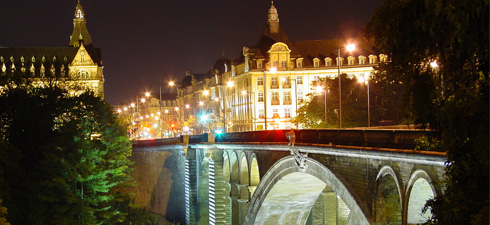The financial crisis has swept away a number of certainties and the 320,000 citizens of Luxembourg are facing a doubtful future. While it takes stock of the significant damage done to the financial industry, which accounts for half of its GDP, it has been shaken by the increasingly irascible mood of its powerful German and French neighbours, which may undermine its main source of revenue. The general election that will be held on 7 June, at the same time as the European elections, is unlikely to cause an upset. The Christian-Democrat and Socialist alliance, led by the experienced and wily Jean-Claude Juncker, will almost certainly maintain its iron grip on power. As elsewhere in Europe, there’s no question of blaming the jockey just because the horse has got a cold.
But has the financial crisis sounded the death knell for the winning formula that has brought wealth to an entire generation? With a financial industry built on banking secrecy, Luxembourg is increasingly facing the spectre of imminent change.
In the valley of the Pétrusse, with its fortress and glass and steel skyscrapers, a cycle appears to have come to a end. The financial fraud orchestrated by American Bernard Madoff cost Luxembourg one billion euros, and the global financial crisis certainly resulted in much greater losses. But this is sustainable in the context of deposits of 2,000 billion euros, which have made the Duchy the world’s third largest offshore banking centre. The real threat is an attack launched by Berlin and Paris on the key to this success: banking secrecy.
In Luxembourg, secrecy has brought prosperity to 150 mainly foreign banks and some 3,000 investment funds. It also provides employment for 70,000 workers and funds a large percentage of generous welfare state spending. The Association of Luxembourg Fund Industry (ALFI) would like to believe that the current period of questioning will not change the status quo, but will allow the Grand Duchy to gain a foothold in markets that were inaccessible in the past.
The most virulent attack came from Germany, a neighbour that has suffered most from tax evasion. Finance Minister Peer Steinbrück bizarrely likened Luxembourg to Ouagadougou in Cameroon, but this paled in comparison to comments made by his colleague SPD leader Franz Müntefering, who in all seriousness, explained that in the past, Berlin would have settled the matter “by sending in the troops.”
Stung to the quick, the Grand Duchy closed ranks, and its parliament unanimously condemned the remarks. Germany “has probably given a huge boost to the election prospects of Jean-Claude Juncker,” says political analyst Charles Margue. But at the same time, it has sent an angry message that the Grand Duchy may be unable to ignore.
Was this article useful? If so we are delighted!
It is freely available because we believe that the right to free and independent information is essential for democracy. But this right is not guaranteed forever, and independence comes at a cost. We need your support in order to continue publishing independent, multilingual news for all Europeans.
Discover our subscription offers and their exclusive benefits and become a member of our community now!












